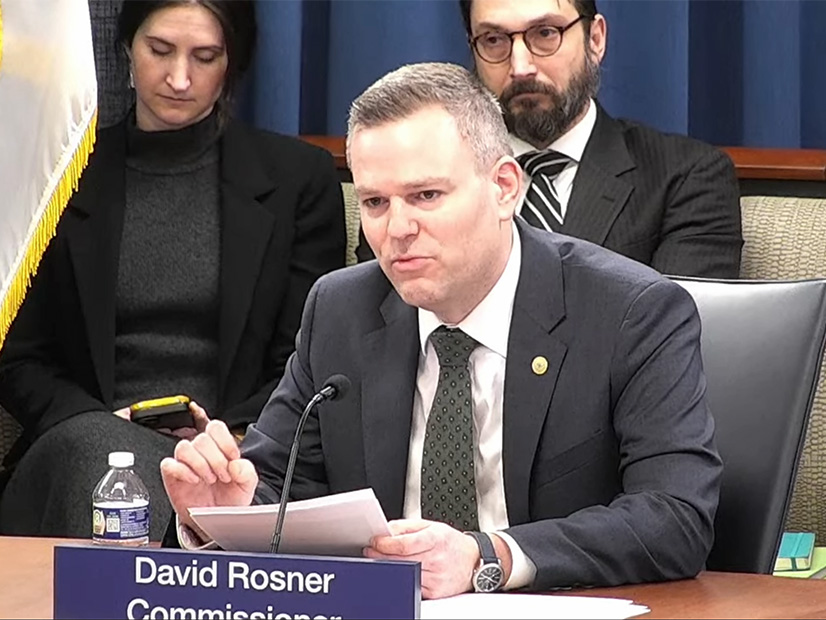FERC on Feb. 20 approved three proposed reliability standards addressing multiple aspects of inverter-based resource performance (RD25-1, et al.), along with another standard relating to entities’ planning for extreme hot or cold weather events (RD25-4).
NERC submitted the three IBR standards PRC-028-1 (Disturbance monitoring and reporting requirements for IBRs), PRC-002-5 (Disturbance monitoring and reporting requirements) and PRC-030-1 (Unexpected IBR event mitigation) in November. (See NERC Submits IBR Standards to FERC.) The ERO also submitted a proposed definition of IBRs, along with two other IBR-related standards, which were not included in FERC’s order; the commission is seeking comment from industry stakeholders on those standards.
PRC-028-1 applies to all generator owners that own NERC-registered IBRs, along with owners of IBRs that will be required to register under the registration criteria proposed by the ERO last June. (See FERC Accepts NERC ROP Changes, Drops Assessment Proposal.) The standard will require entities to install disturbance monitoring equipment on their IBRs in order to collect sequence-of-event recording, fault recording and dynamic disturbance recording data.
This information will be used to evaluate IBR ride-through performance during system disturbances and provide data for IBR model validation, NERC said in its proposal. GOs also will be required to fix any failures in disturbance monitoring capabilities.
PRC-002-5 updates PRC-002-4 to clarify its applicability to non-IBR grid elements, while also adding data collection and sharing requirements similar to those in PRC-028-1.
PRC-030-1 requires entities to develop a process for identifying “complete facility loss of output or certain changes of real power output” and to implement corrective plans to address performance issues when necessary.
The implementation plan for PRC-030-1 states that the standard will become effective on the first day of the first calendar quarter that is 12 months after either its approval or that of PRC-029-1 (Frequency and voltage ride-through requirements for IBRs), whichever is later. PRC-029-1 is one of the standards awaiting industry comment.
For PRC-002-5 and PRC-028-1, NERC requested the standards become effective on the first day of the first calendar quarter following their approval.
Standard Mandates Extreme Weather Planning
The final standard approved at FERC’s open meeting was TPL-008-1 (Transmission system planning performance requirements for extreme temperature event), which NERC submitted Dec. 17, 2024, following approval by the ERO’s trustees at their December meeting. (See “Standards Approved for FERC Submission,” NERC Board of Trustees Briefs: Dec. 10, 2024.)
NERC developed the standard in response to FERC’s Order 896, which directed the ERO to develop a standard to require entities to plan for extreme hot and cold weather.
TPL-008-1 will mandate that “planning entities in defined zones” work with each other to develop extreme temperature assessments at least once every five years. When such assessments identify instances where performance requirements would not be met during periods of extreme heat or cold, entities would need to develop and share corrective plans to address the problem.
Compliance dates for the standard will be phased over five years, a plan that NERC said would balance “the urgency in the need to implement the proposed [standard] against the reasonableness of the time allowed for those who must comply to develop the necessary processes and capabilities to perform these new wide-area extreme temperature studies.”
FERC approved the standards at its first monthly open meeting under Chair Mark Christie. Commissioner Judy Chang said she was “very pleased” with the cold weather standard, calling it “an incremental step, but … a step in the right direction.” Commissioner David Rosner agreed while pointing out that further work is needed to address the growing issue of extreme weather.
“While we’ve had really good progress so far on the cold weather front, the job is not done,” Rosner said. “Both FERC and NERC have repeatedly acknowledged the risk that extreme weather events pose to grid reliability, and NERC, at the end of last year, [released] an Interregional Transfer Capability Study that found that the [grid] is vulnerable to extreme weather. … I look forward to comments on that study and working with my colleagues here to make sure that we fulfill our duty … which is to ensure a reliable grid for American consumers.”




